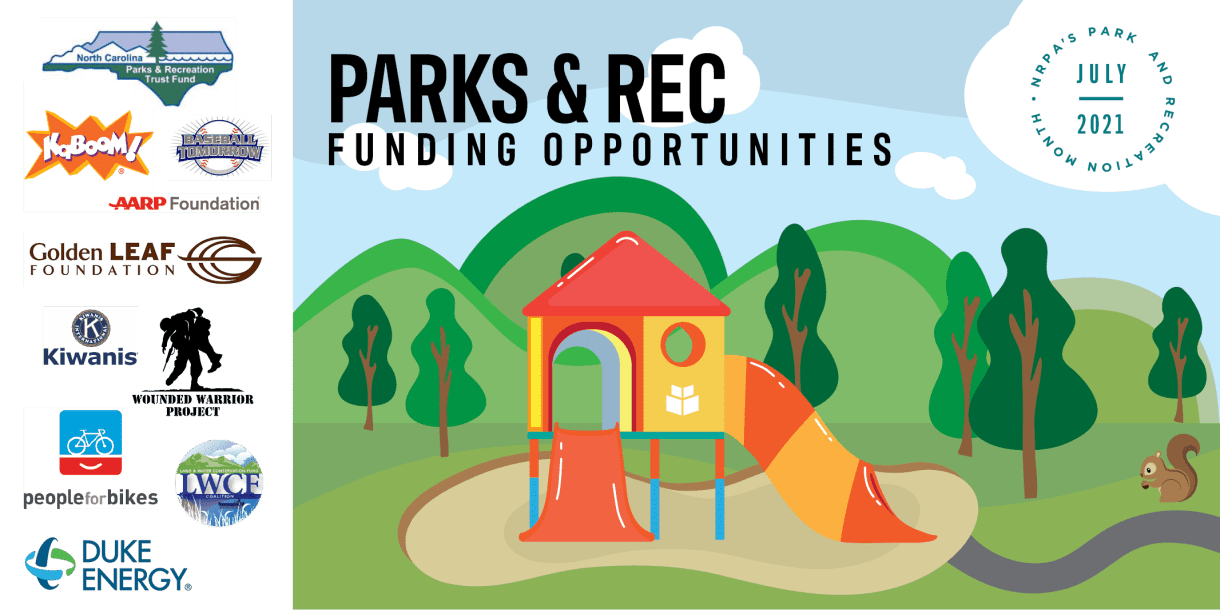
Parks and recreational programs are essential to healthy communities. According to a 2017 survey by the National Recreation and Park Association, 95 percent of local government officials use their local park areas personally, and 99 percent agree their communities benefit from local park areas. Yet despite this overwhelming support, these same officials acknowledge that parks and recreation are likely to receive the largest cuts to spending when there are budgetary pressures or shortfalls. How can local governments go about funding parks and recreation projects when general funds are not enough?
Fortunately, there are several state, federal, and private programs that provide grant funding assistance for parks and recreation initiatives. We have highlighted a few of the more popular programs below.
State & Federal
North Carolina Parks and Recreation Trust Fund (PARTF)
The North Carolina Parks and Recreation Trust Fund (PARTF) awards matching grants to local governments for parks, public beach access, and improvements in state parks.
NCDOT Bicycle and Pedestrian Planning Grant Initiative
The NCDOT Division of Bicycle and Pedestrian Transportation and the Transportation Planning Branch created this annual matching grant program to encourage municipalities to develop comprehensive bicycle plans and pedestrian plans.
Recreational Trails Program (RTP)
The Recreational Trails Program (RTP) provides funds to the States to develop and maintain recreational trails and trail-related facilities for both non-motorized and motorized recreational trail uses.
Land and Water Conservation Fund (LWCF)
The State Side of the LWCF provides matching grants to States and local governments for the acquisition and development of public outdoor recreation areas and facilities. The LWCF is vital in sourcing federal financing for the development and creation of local parks, trails, boat launches, sports fields and other recreation environments.
Did You Know?
With the passage of the Great American Outdoors Act (GAOA), the Land and Water Conservation Fund is permanently funded and will receive $900 million annually. Additionally, the GAOA has set aside up to $9.5 billion to address deferred maintenance projects on public lands.
USDOT BUILD Discretionary Grants
Better Utilizing Investments to Leverage Development (BUILD) Transportation Discretionary Grants program funds capital investments in multi-modal surface transportation infrastructure that aim to make transportation systems safer and more efficient.
USDA Community Facilities Loans/Grants
This program provides affordable funding to develop essential community facilities in rural areas. Funds can be used to purchase, construct, and/or improve essential community facilities such as child care centers, community centers, senior centers, and fairgrounds.
Private
PeopleForBikes Community Grant Program
The PeopleForBikes Community Grant Program provides funding for important projects that build momentum for bicycling in communities across the U.S. These projects include bike paths and rail trails, as well as mountain bike trails, bike parks, BMX facilities, and large-scale bicycle advocacy initiatives.
Safe Places to Play Grants
The U.S. Soccer Foundation awards Safe Places to Play grants on a rolling basis to support field-building initiatives nationwide with a specific focus on creating soccer facilities.
WithersRavenel has experience with these grant funding programs as well as other sources of funding such as loans and bonds. While the 2021 application deadlines have passed for these programs, we encourage you to start thinking about potential eligible projects for next year. If you have a project that doesn’t seem to fit one of the funding sources outlined above, don’t worry! There are more funding sources out there that we can help you navigate.
Contact us today to discuss your project ideas and funding needs. Our Funding & Asset Management team can help you get on track—and stay on track—to meet the deadlines of the 2022 funding schedule. Contact us at funding@withersravenel.com to learn more or get started!
This post was originally published on July 7, 2020, and was updated on July 22, 2021.
